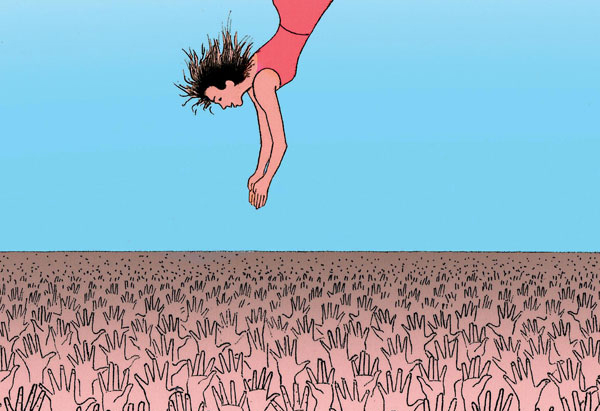The Praise Drug
If you dive into situations, seeking a pat on the back a little too often, maybe you've got a praise addiction. Martha Beck has a plan for those who can't stop going for the glory.

Illustration: Guy Billout
You'd have admired Sarah if you'd met her when I did. She was beautiful, brilliant, charming, the CEO of her company, the life of the party. She thrived on all that admiration; you could feel it in the razzle-dazzle energy that drew people to her like flame-bound moths. You'd never have suspected that Sarah was an addict, unless you'd seen her a few hours after she'd glowingly received an award or ovation, when she was curled up in bed, anxious, needy, already jonesing for a fix.
Sarah was abusing something more powerful, insidious, and accessible than any street drug: the adoration and esteem of others that some psychologists call narcissistic supply. Simply put, she was addicted to praise. Her entire life revolved around eliciting positive attention from others, and she succeeded magnificently—but always insufficiently. Being praised launched her briefly into manic giddiness, then dropped her into troughs of depression that made King Lear look like Howdy Doody.
You may have some experience with this particular addiction. And your background may have put you at risk. If your parents linked their acceptance to your achievements, if you were educated in a competitive system, if you ever participated in sports, theater, a job, motherhood—in short, if you live in this world—then you've been set up to get hooked on praise.
Now, you may be the unusual individual who's untouched by praise addiction. You may savor compliments without wanting them, enjoy performing well even if no one notices, love working whether or not you're succeeding. If so, you have my deepest respect (and you don't really care). But if you ever walk in Sarah's fashionable, excruciating shoes—seeking approval obsessively, riding increasingly painful waves of hollow elation and overwhelming despair—it's time to sober up.
3 signs you may be an approval junkie
Sarah was abusing something more powerful, insidious, and accessible than any street drug: the adoration and esteem of others that some psychologists call narcissistic supply. Simply put, she was addicted to praise. Her entire life revolved around eliciting positive attention from others, and she succeeded magnificently—but always insufficiently. Being praised launched her briefly into manic giddiness, then dropped her into troughs of depression that made King Lear look like Howdy Doody.
You may have some experience with this particular addiction. And your background may have put you at risk. If your parents linked their acceptance to your achievements, if you were educated in a competitive system, if you ever participated in sports, theater, a job, motherhood—in short, if you live in this world—then you've been set up to get hooked on praise.
Now, you may be the unusual individual who's untouched by praise addiction. You may savor compliments without wanting them, enjoy performing well even if no one notices, love working whether or not you're succeeding. If so, you have my deepest respect (and you don't really care). But if you ever walk in Sarah's fashionable, excruciating shoes—seeking approval obsessively, riding increasingly painful waves of hollow elation and overwhelming despair—it's time to sober up.
3 signs you may be an approval junkie



